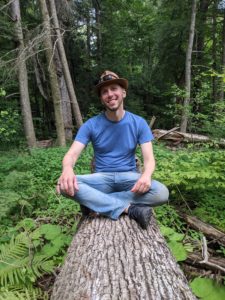Hi, I’m Josh Stein, and I’m kinda awkward

Equal parts analytical and empathetic.
Nerdy and outdoorsy. Dorky and serious. Cynical and optimistic.
I don’t really ‘get’ politeness (and sometimes I find that being clear is kindest).
ISTP / Enneagram 6w5 / neurodivergent
A few things to know about me:
-
- Under the hood, the foundation of my approach is something called Circling, a sort of deep-empathy or mindful-conversation practice aimed at ‘getting’ someone’s world. I was trained and certified in the Integral Circling facilitation method in 2012 and in ‘Surrendered Leadership’ Circling in 2015.
-
- I also have a Masters in Human Factors Engineering from the University of Toronto where I specialized in the design and usability of ‘smart’ thermostats. While I don’t practice engineering, this experience shaped me, how I see the world, and how I show up with my clients.
And this is how I got into Awkward Leadership
When I started working as a group facilitator in 2012, I struggled with overthinking, overplanning, and worrying about ‘doing it right.’ Then I realized the key to effectively holding the kind of space where insights, healing, and connection happen requires the opposite of that. Let me explain…
I loved the deep-listening modality I’d been trained in. I believed in it. Still do. But I was so focused on delivering it PERFECTLY that I was having trouble staying present and focusing on the client in front of me. I kept feeling overwhelmed in sessions and zoning out (which, when your whole modality is about listening, is a problem). I thought I just had to Try Harder, but that only made it worse.
Sessions became energetically draining and I came dangerously close to burning out and giving up.
It wasn’t until I found a mentor who encouraged me, in a safe practice environment, to disclose the difficulty I was having to my client, in the session, that something began to shift. I practiced admitting when I was zoning out — “I’m sorry, I didn’t catch that, can you repeat it?” — surrendering to whatever I was experiencing in the moment, and surviving it. And this allowed me to be much more present in my sessions.
Then, through this practice of disclosure, I realized that because of my sensitivity I was often mirroring the experience of my client. If I was zoning out, it was often because they were also zoning out. If I was feeling angry or scared for no apparent reason, I was often picking up on their anger or fear (sometimes even before they did). It led to richer discussions, deeper insights, and profound moments of catharsis.
I learned to trust my instincts more, and discovered a sense of aliveness I could tap into when I let go of how a session was ‘supposed to’ be.
I got into flow states; I felt playful and mischievous (and it felt great — also completely different from trying to do everything ‘right’). My work became more transformative for my clients, and more energizing for me.
I started to coach other facilitators who were getting stuck in similar ways, and realized that neurodivergent coaches, therapists, and leaders share the same struggles with perfectionism, people-pleasing, impossible expectations, and masking — which too often leads to burnout.
|
Yes, plans are helpful, but what’s needed more than anything is your presence, curiosity, and trust that the next right action (or inaction) will emerge from uncertainty and openness.
Awkwardness is the right feeling when we don’t know what to do next. It asks us to slow down and find out.
Can you lean in to that? |
Today, I help neurodivergent professionals to:
-
- Give your full attention and focus to your clients in session, without empathically merging and draining your battery
-
- Accept where you are on any given day, rather than holding yourself to an impossible standard or trying to force yourself into a mold of “shoulds.”
-
- Trust your intuition and act on it, rather than sticking to The Plan at any cost. You’ll find that you get into the flow state (or, in a group setting, a shared flow state) that leads to realizations and catharses.
-
- Grow your self-awareness and self-connection so you can honor what is true for you in any given moment. Staying in integrity with yourself and feeling grounded is the most important factor to avoiding burnout.
Learn more about working together
|
The Art of Being Real (group program) Practice unmasking and sharing what you normally hold back in a safe space (because not being yourself is exhausting) |
Relational Burnout Sessions (1on1) Stop the self-defeating behaviour patterns that keep you over-stretched and overwhelmed |